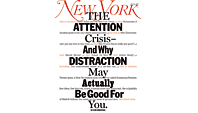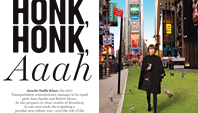
1. Responses to Sam Anderson’s “In Defense of Distraction” (May 25) included:
• “Your article was a great distraction from my work.”
• “I actually managed to read this entire article online with only two Twitter refreshes and one online window-shopping session in between, while the pages were loading. I think that means you’ve written an excellent article.”
• “I stopped reading after the first paragraph to see if there were any good comments.”
• “I began reading with a commitment to hold to the author’s challenge, but by page four I had toasted a bagel, twittered my remembrance of the victims of the Molasses Disaster, proclaimed to the world the name of my new punk band, and solicited suggestions for track titles. I then realized how distracted I had become, and with a gold Sharpie, I wrote above the function row on my laptop, “Are you procrastinating?” I then went back and finished the article.”
• “This just strikes me because I am a large multitasker—I realized at one point this year that during my math course (which was easy, so I didn’t feel a giant pull for attention) I was checking many news sources on my phone. I don’t know if this is indeed bad or good.”
• “This world of distraction, overstimulation, and attention-deficit-disordered behavior is, in fact, the real world and constitutes our real experiences of living in it. Of that much I am sure. Do not kid yourself. This is no illusion. Personally, I find it entertaining (another word for distracting?). I enjoy the negotiation of the various connections and intersections. And lately I’m beginning to get the knack of reading online. I’ve long since stopped writing with a pen.”
• “For me, distraction is just therapeutic. Sometimes I have to do very mundane, repetitive tasks for hours at a time at work, and if I didn’t check Facebook every once in a while, all I would earn myself is a tension headache and a really bad mood. As with most everything in life, distraction is good in moderation. By the way, I’m one of those terrifying Internet-generation kids, and I have no trouble triple-majoring at a quasi–Ivy League school while working part time and volunteering on a weekly basis. If you have the drive to do something, you will get it done. At some point it becomes more important to you than surfing the Internet.”
• “The problem is not that my children can hold 34 simultaneous conversations and that I (a spry 45-year-old) cannot. I can, and I do it more than they do. The difference is that I know the cost of this behavior. They are growing up without any real reference point to assess that cost with (something that I take part of the blame for), and believe this multitasked, hyperconnected state to be normal. It is not.”

2. If attention-deficit disorder doesn’t get you, traffic surely will. Regarding Michael Crowley’s profile of Janette Sadik-Kahn, the city Transportation commissioner who is renegotiating the use of the streets so that more belongs to pedestrians and bicyclists and less to drivers (“Honk, Honk, Aaah,” May 25), the comments, mostly positive, cheered Sadik-Khan on. “Now that I know who is making all these wonderful changes to my neighborhood and my borough, I want to say Thank you, Sadik-Khan! Keep up the good work. How about a bike line all the way up Tenth Avenue/Amsterdam? It would help me get to work.” Two-wheel evangelists made their case, including one who sees the recession as a possible boost to bike culture: “As the city enters a recession, know that there is no cheaper way to get around the city, to bounce from free summer concert to free gallery show to friends’ apartments—to live rich lives regardless of income.” But Sadik-Kahn also came in for a bit of the road rage that Crowley described as being directed at the anti-car movement, mostly by people who find the movement elitist. “I have no praise for Sadik-Kahn whatsoever. Bike lanes in Manhattan are one thing, but when you throw unused bike lanes all across the city, especially in outer-borough areas where there is not and never will be demand for them, it strikes a very arrogant tone that is disrespectful of the community. Taking away hundreds of parking spaces for unused bike lanes is just plain stupid.” And a former air-traffic controller doesn’t much like what he sees from her, either: “The primary goal of a Transportation commissioner should be the expeditious flow of traffic. Janette Sadik-Khan’s reshaping of the city’s roads makes as much sense to me as would the truncation of the holding patterns around Kennedy airport in order to create a safe corridor for balloonists traveling to the Hamptons.” For some, it was strictly practical considerations that hurt an otherwise tempting transportation plan. “As someone looking to start biking in the city, I’m discouraged to find that it’s regarded as generally impossible to park a “nice” bike in NYC without doubling the price and weight of the bike with security measures. Put bike racks on more streets, create protected parking areas, and step up enforcement. I can’t ride to a movie or dinner if I know I probably won’t have a bike to ride back on.”
3. The proprietors of the Gilt Restaurant at the New York Palace hotel wrote in to challenge the description in Jennifer Senior’s “Recession Culture “(May 18). “It was highly disappointing and disturbing to read the unsubstantiated reporting that Gilt restaurant is ‘on life support.’ The situation is particularly ironic, as on May 12, the expansion of Gilt with a new seasonal patio called Palace Gate was the headline of your magazine’s Grub Street food blog. Rumors of the restaurant’s ill health were greatly exaggerated.”
Send correspondence to: [email protected].